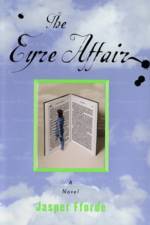

| . | ||
| Click on a book's image or title to order from Amazon.com |

The Eyre Affair
Viking, HC, © 2002, 374 pp, ISBN #0-670-03064-3Reviewed November 2003
Fforde has crafted here a lively fantasy of an alternate Earth where practically anything can happen - and, as the saying goes, usually does. The protagonist is a 30-something woman named Thursday Next, who works for the literary detective branch of British Special Operations, which means she usually investigates thefts, forgeries, that sort of thing. As LiteraTec is only SO-27 (SO-1 being the highest rank), they don't get a lot of respect from their own organization or the public. Next is a veteran of the ongoing war with Russia on the Crimean Peninsula, having lost her brother there, and afterwards her fiance when he spoke out against her brother's actions. And her father is a renegade member of the ChronoGuard, supposedly trying to set history straight.
Next is one day suddenly drafted into SO-5 to try to capture Acheron Hades, the third-most dangerous man on SpecOps' list. Hades was once Next's teacher, and he has supernatural powers and a streak of pure evil which makes him almost impossible to capture or kill. When the sting goes horribly wrong and only Next is left alive - and Hades believed dead - she has a premonition from the future to take a job in her home town of Swindon.
And indeed Hades is not dead, but he in fact captures her uncle and aunt and a machine her uncle has concocted which allows people to enter books and affect their outcomes - and if one alters the original manuscript of a book, then all copies of that book become changed as well. Hence, the title of the book, referring to Charlotte Bronte's novel Jane Eyre. Next must defeat Hades, rescue her aunt and uncle, and save a classic of western literature, all with the Goliath Corporation - the most powerful entity in Britain - breathing down her neck.
The Eyre Affair - make no mistake - is not a deep book, falling just a little on this side of being "fluff". It feels reminiscent (if not derivative) of authors such as Douglas Adams and Phil Foglio (particularly the "everything and the kitchen sink too" feeling of the latter's Buck Godot: Zap Gun for Hire comic book). It's somewhat more sophisticated than J. K. Rowling's Harry Potter series - but not a lot.
That said, it is certainly a fun romp. What Fforde is selling here is not so much the characters (who are not very distinctive) or the story, as the ride, and more significantly, the world. The world is made up of a melange of many fantastic elements, including time travel, alternate history, demons and vampires, as well as Fforde's own concoctions, most notably the twist on entering fictional settings. This is naturally the focus of the book, but her time travelling father pops up a few times (and I hope it gets more time in future books, since I found it more compelling than the literary elements).
Fforde is a bit too self-conscious in his use of character names. Thursday Next? Paige Turner? Jack Schitt? The one-off gags get in the way of the story pretty quickly, especially whenever someone has a name that the reader doesn't quite "get", and wonders if he's missing a joke. Seems like the characters could have evocative names without being outright puns.
The book's biggest flaw, though, is that although it throws suspension of disbelief out the window pretty forcefully early on and never really looks back, it also doesn't quite "play fair" in its handling of the book's puzzles. For instance, one wonders how Thursday's uncle Mycroft could have come up with such potent inventions without picking up substantial attention from the government - whether or not he wanted it. Worse, the ultimate solution to the Hades problem seems so blindingly obvious that one wonders that no one thought of it before - and indeed it's simply implausible that no one in Next's world had thought of it before; the reader overlooks it because he simply can't believe it hasn't been tried and discarded in the past. This was a huge "aaargh!" moment in the narrative.
On the other hand, Fforde's narrative is genuinely engaging, and Thursday is charming enough, although not especially distinguished as a protagonist. Her love-life, a recurring theme, takes a rather implausible and unsatisfying turn at the end, making you wonder if you know her at all. The story contains quite a few literary and historical references, but mostly you only need a decent high school or college background to understand them. And the letdown to the Hades situation wouldn't have been so great if Fforde hadn't done such a good job building it up.
In sum, The Eyre Affair is an enjoyable and rollicking romp, and hopefully a sign of better things to come as Fforde develops as a writer. I know that there's at least one sequel out already, and I hope he takes a step back to embroil Thursday in the larger issues of her world, because the entering-into-books thing has now been done, and frankly I'm much more intrigued by the time travel and supernatural elements set up here.
hits since 2 November 2003.